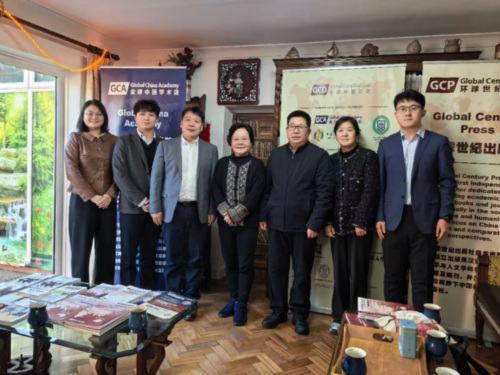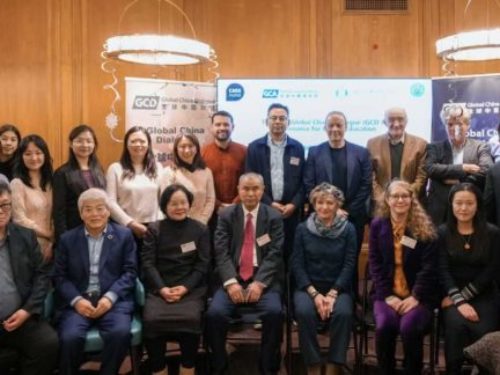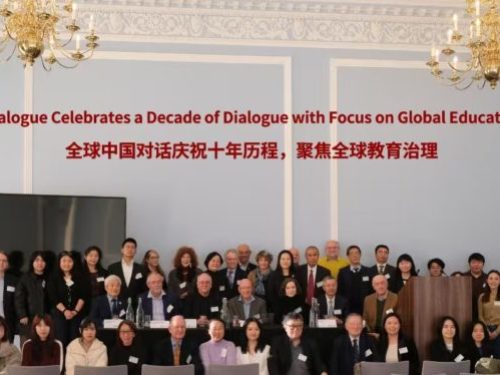

The international conference entitled ‘How do Migrants from the BRICS Countries Participate in Shaping the Global Society?’ was successfully held on the 2nd March 2013 at CLM.2.02 of LSE.
Professor Athar Hussain, Director of Asian Research Centre, LSE, opened the conference. Lord Michael Bates gave an interesting opening address. A China based expert on ‘migrant studies’ Professor Minghuan Li, and an UK based expert on ‘migration studies’, Dr Nicholas Van Hear, made keynote speeches respectively. Eight team members of the project on the BRICS migrant studies presented their papers around two themes: ‘Case studies on the BRICS migrants and migration in the global society’, and ‘The relationship migrated citizens have with their countries of origin in a global society’. Dr Xiangqun Chang gave a very brief overview by clarifying the research topic and interests, disseminating basic data from both fieldwork and online questionnaire survey. The audience actively participated in the ‘question and answer’ panels. The closing panel was formed by three professors. Professor Ronald Skeldon gave a clossing presentation, Professor Karamjit Gill made some general comments and finally Professor Stephan Feuchtwang made closing remarks.
Background
China in Comparative Perspective Network (CCPN) at LSE is engaged in an international collaborative research project known as ‘Comparative Studies on the New Migrants from BRIC counties in America, Australia, Japan and the UK’ (2009-2013). The project is collaborative with the School of Sociology, Kwansei Gakuin University, Japan. It is funded by the Japan Society for the Promotion of Science (JSPS) and involves researchers from Australia, Brazil, China, Hong Kong, Japan, Russia, Singapore, Sri Lanka, UK, and USA. Our research focuses on ‘new migrants’ who have migrated from BRIC countries to the UK, the USA, Australia and Japan since 1989.
In responding to the changes from BRIC to BRICS, the large and fast-growing economies (Brazil, Russia, India, China and South Africa), which significantly influence regional and global affairs, we have added migrants from South Affric in the UK in the comparative studies. Both the BRICS countries themselves and the migrants they send out are of great importance in shaping the future of global society.
Our research can be used to identify ways of fostering the economic and social well-being of BRICS migrants in the four countries under study, and enhance their economic and social contributions to their host countries. We are also interested in ways in which migrants residing abroad can assist in the development of their home countries.
Apart from standard social scientific methods this project uses online questionnaire survey (it will be held until the 31st January 2013). You are welcome to participate in the survey and the data can be shared at your request.
Instead of performing ‘migration studies’ this project expands the field into ‘migrant studies’. It focuses on ‘ordinary migrant people’ in contrast to simply paying attention to a special group of people as an example of human rights issues in migration studies. We believe ‘ordinary people’ are the basis of any society.
Organisers and convenors
Organisers:
- Asia Research Centre, LSE
- China in Comparative Perspective Network (CCPN), LSE
- Kwansei Gakuin University (KGU), Japan
- Zhejiang UK Association (ZJUKA), UK
Convenors:
- Professor Lixing Chen, School of Sociology, Kwansei Gakuin University, Japan; President of Japan-Sino Sociological Association
- Dr Xiangqun Chang, Co-Director of China in Comparative Perspective Network (CCPN), LSE
Programme
Morning session 9:00-13:00
Chair: Professor Athar Hussain, Director of Asia Research Centre, LSE
Opening session 9:00-10:15
- BRICS migrants in the UK, By Lord Michael Bates, Deputy Speaker and Deputy Chairman of the House of Lords
- The Chinese in Europe: Migration history and their participation in shaping European society, by Professor Minghuan Li, Department of Sociology, Xiamen University, China; Consultant of Overseas Chinese Affairs Office of State Council, PRC
- The changing global migration order: two decades of turbulence, by Dr Nicholas Van Hear, Senior Researcher and Deputy Director of the Centre on Migration, Policy and Society (COMPAS), University of Oxford, UK
Case studies on the BRICS migrants and migration in the global society
10:15-10:45 Is Japan’s Labour Structure in Transition? Lessons from the Brazilian Labour in the Mie Prefecture, by Professor KUMARA Ananda, Vice-President of Suzuka International University, Japan [ppt ; paper summary]
10:45-11:15 Skilled Russian Migration: Impact on Development through Empowerment, by Dr Esuna Dugarova, Research Analyst, United Nations Research Institute for Social Development (UNRISD), Switzerland [ppt]
11:15-11:30 break
11:30-12:00 From vulnerability to flexibility: Indian middleman traders in Shaoxing, China, by Mr Ka-kin Cheuk, PhD candidate, Institute of Social and Cultural Anthropology, St. Antony’s College, University of Oxford, UK [ppt]
12:00-12:30 Chinese lawyers in Brazil, Australia and the UK – a three way comparison, by Ms Helen Tung, Barrister, 1 Temple Avenue Chambers, London, UK [ppt]
12:30-13:00 South Africa as the BRICS Gateway to Africa and its Implications for Migration Patterns, by Ms Ana Faria-Santana, by CCPN Research Associate, LSE; former Research Director, Centre for Chinese Studies, University of Stellenbosch – South Africa [ppt]
13:00-14:00 Lunch (will be provided at CLM 7.02)
Afternoon session: 13:00-17:00
The relationship migrated citizens have with their countries of origin in a global society
Chair: Dr Kent Deng, Director of CCPN and Reader in Economic History, LSE
2:00-:2:30 Comparative studies on what influence the migration from BRICS channelling back to their home countries, by Professor CHEN Lixing, PI of the BRIC migrant project, School of Sociology, Kwansei Gakuin University, Japan; President of Japan-China Sociological Society (JCSS), Japan
2:30-3:00 Homeland Calling, Family Pulling: New Migrants from BRICS Countries in the UK, USA, Australia and Japan, by Dr SHAO Chunfen, Lecturer of Department of Japanese Studies, the University of Sydney, Australia
3:00-3:15 break
3:15-3:45 Allegiance Problems to Settled and Home Countries: Dynamics and Effects, by Professor KOMAI Hiroshi Professor Emeritus, the University of Tsukuba, Japan
3:45-4:15 How do Migrants from the BRICS Countries Participate in Shaping the Global Society? An overview by Dr Xiangqun Chang, Co-PI of the BRIC migrant project, Co-Director of China in Comparative Perspective Network (CCPN), LSE, UK [ppt]
4:15-5:30 Closing session
- Professor Ronald Skeldon, Department of Geography, School of Global Studies, University of Sussex [ppt]
- Professor Karamjit Gill, Human Centred Systems, University of Brighton; Editor of AI & SOCIETY: Journal of Knowledge, Culture and Communication
- Professor Stephan Feuchtwang, Department of Anthropology, founding Director of China in Comparative Perspective Network (CCPN) and MSc Programme, LSE
Related info
Click HERE to download programme
Click HERE to download abstracts
LSE weblisting:
http://www2.lse.ac.uk/publicEvents/events/2013/03/20130302t0900vCLM202.aspx
ZJUKA: http://www.zjuka.org.uk/page13.html
If you have any question please write to: ccpn@lse.ac.uk
Notes:
1. This event was organised when CCPN was at LSE. Please contact CCPN Global with its new email address: info@ccpn-global.com.
2. We will update the ppt or paper summaries soon.
3. The conference collection will be buplished by the end of 2013 (this page will be updated accordingly)
Photos

Some attendees at the conference
Click HERE to Chinese page




